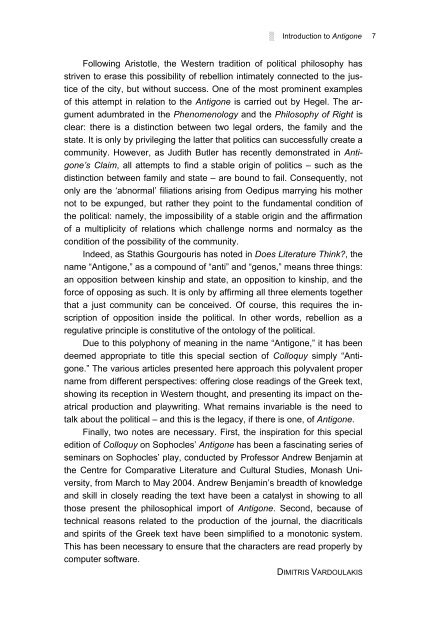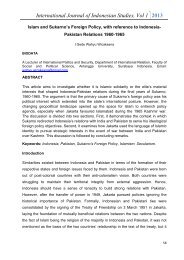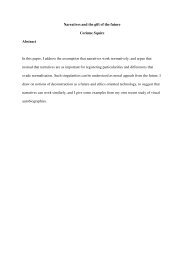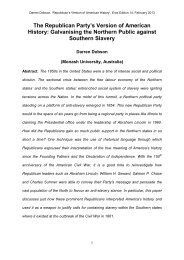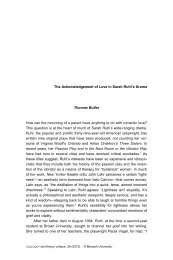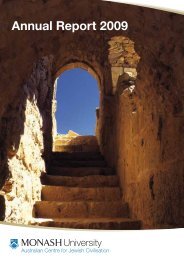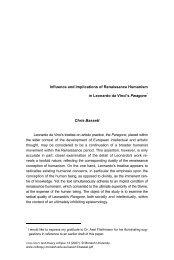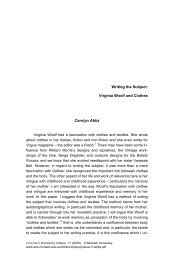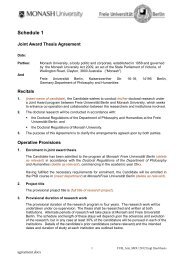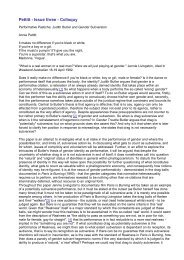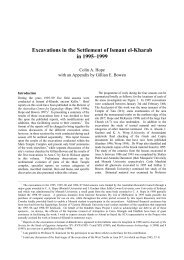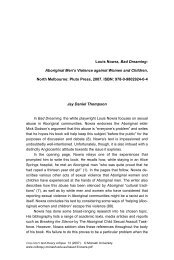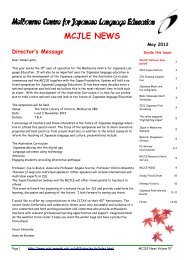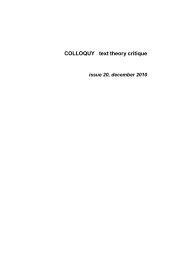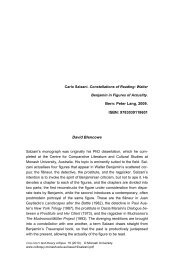- Page 1: COLLOQUY text theory critiqueissue
- Page 4 and 5: 2Contents░REVIEW ARTICLESLiz Cono
- Page 6 and 7: EditorialIssue 11 of Colloquy: text
- Page 10 and 11: Figures of Commonality in Sophocles
- Page 12 and 13: 10Carlo Salzani░sents, in additio
- Page 14 and 15: 12Carlo Salzani░obsession and mad
- Page 16 and 17: 14Carlo Salzani░more than inclusi
- Page 18 and 19: 16Carlo Salzani░not force, not vi
- Page 20 and 21: 18Carlo Salzani░ErosDeny thy fath
- Page 22 and 23: 20Carlo Salzani░denies burial to
- Page 25 and 26: ░ Figures of Commonality in Sopho
- Page 27 and 28: ░ Figures of Commonality in Sopho
- Page 29 and 30: ░ Figures of Commonality in Sopho
- Page 31 and 32: ░ Figures of Commonality in Sopho
- Page 33 and 34: Mourning the Public Body in Sophocl
- Page 35 and 36: ░ Mourning the Public Body 33ings
- Page 37 and 38: ░ Mourning the Public Body 35Oedi
- Page 39 and 40: ░ Mourning the Public Body 37chor
- Page 41 and 42: ░ Mourning the Public Body 39affe
- Page 43 and 44: ░ Mourning the Public Body 41stag
- Page 45 and 46: ░ Mourning the Public Body 43stum
- Page 47 and 48: ░ Mourning the Public Body 45outr
- Page 49 and 50: ░ Mourning the Public Body 47spec
- Page 51 and 52: ░ Mourning the Public Body 49The
- Page 53 and 54: ░ Mourning the Public Body 51slee
- Page 55 and 56: ░ Mourning the Public Body 53atte
- Page 57 and 58: ░ Mourning the Public Body 55(Rec
- Page 59 and 60:
░ Mourning the Public Body 57resi
- Page 61 and 62:
░ Mourning the Public Body 59case
- Page 63 and 64:
░ A Danish Antigone 61revisited v
- Page 65 and 66:
░ A Danish Antigone 63isolation a
- Page 67 and 68:
░ A Danish Antigone 65punished wi
- Page 69 and 70:
░ A Danish Antigone 67Fear and Tr
- Page 71 and 72:
░ A Danish Antigone 69tragic of b
- Page 73 and 74:
░ A Danish Antigone 71In his jour
- Page 75 and 76:
░ A Danish Antigone 73ern Drama
- Page 77 and 78:
░ A Danish Antigone 7545 Accordin
- Page 79 and 80:
░ Ethical Consciousness in the Sp
- Page 81 and 82:
░ Ethical Consciousness in the Sp
- Page 83 and 84:
░ Ethical Consciousness in the Sp
- Page 85 and 86:
░ Ethical Consciousness in the Sp
- Page 87 and 88:
░ Ethical Consciousness in the Sp
- Page 89 and 90:
░ Ethical Consciousness in the Sp
- Page 91 and 92:
░ Ethical Consciousness in the Sp
- Page 93 and 94:
░ Ethical Consciousness in the Sp
- Page 95 and 96:
░ Ethical Consciousness in the Sp
- Page 97 and 98:
░ Ethical Consciousness in the Sp
- Page 99 and 100:
░ Ethical Consciousness in the Sp
- Page 101 and 102:
The Precedence of Citation:On Brech
- Page 103 and 104:
░ The Precedence of Citation 101n
- Page 105 and 106:
░ The Precedence of Citation 103p
- Page 107 and 108:
░ The Precedence of Citation 105i
- Page 109 and 110:
░ The Precedence of Citation 107I
- Page 111 and 112:
░ The Precedence of Citation 109A
- Page 113 and 114:
░ The Precedence of Citation 111h
- Page 115 and 116:
░ The Precedence of Citation 113m
- Page 117 and 118:
░ The Precedence of Citation 115n
- Page 119 and 120:
░ The Precedence of Citation 117M
- Page 121 and 122:
░ The Precedence of Citation 119i
- Page 123 and 124:
░ The Precedence of Citation 121G
- Page 125 and 126:
░ The Precedence of Citation 123o
- Page 127 and 128:
░ The Precedence of Citation 125R
- Page 129 and 130:
No Longer Lost for WordsAntigone’
- Page 131 and 132:
░ No Longer Lost for Words 129It
- Page 133 and 134:
░ No Longer Lost for Words 131a c
- Page 135 and 136:
░ No Longer Lost for Words 133ser
- Page 137 and 138:
░ No Longer Lost for Words 135twe
- Page 139 and 140:
░ No Longer Lost for Words 137tha
- Page 141 and 142:
░ No Longer Lost for Words 139sho
- Page 143 and 144:
░ No Longer Lost for Words 141whi
- Page 145 and 146:
░ No Longer Lost for Words 143an
- Page 147 and 148:
░ No Longer Lost for Words 145of
- Page 149 and 150:
░ No Longer Lost for Words 147199
- Page 151 and 152:
░ Irish Antigones 149dies of Aesc
- Page 153 and 154:
░ Irish Antigones 151proud of her
- Page 155 and 156:
░ Irish Antigones 153This traditi
- Page 157 and 158:
░ Irish Antigones 155written in I
- Page 159 and 160:
░ Irish Antigones 157narcissism,
- Page 161 and 162:
░ Irish Antigones 159effort to co
- Page 163 and 164:
░ Irish Antigones 16115 Declan Ki
- Page 165 and 166:
GENERAL ARTICLES
- Page 167 and 168:
░ Imperial Therapy 165i. The prof
- Page 169 and 170:
░ Imperial Therapy 167never suspe
- Page 171 and 172:
░ Imperial Therapy 169the entry t
- Page 173 and 174:
░ Imperial Therapy 171erary pasti
- Page 175 and 176:
░ Imperial Therapy 173the immedia
- Page 177 and 178:
░ Imperial Therapy 175but employe
- Page 179 and 180:
░ Imperial Therapy 17729 Bret Har
- Page 181 and 182:
░ “Nothing new under the sun”
- Page 183 and 184:
░ “Nothing new under the sun”
- Page 185 and 186:
░ “Nothing new under the sun”
- Page 187 and 188:
░ “Nothing new under the sun”
- Page 189 and 190:
░ “Nothing new under the sun”
- Page 191 and 192:
░ “Nothing new under the sun”
- Page 193 and 194:
░ “Nothing new under the sun”
- Page 195 and 196:
░ “Nothing new under the sun”
- Page 197 and 198:
Intrinsic and Extrinsic Nature of T
- Page 199 and 200:
░ Intrinsic and Extrinsic Nature
- Page 201 and 202:
░ Intrinsic and Extrinsic Nature
- Page 203 and 204:
░ Intrinsic and Extrinsic Nature
- Page 205 and 206:
░ Intrinsic and Extrinsic Nature
- Page 207 and 208:
░ Intrinsic and Extrinsic Nature
- Page 209 and 210:
░ Intrinsic and Extrinsic Nature
- Page 211 and 212:
Writing the Subject:Virginia Woolf
- Page 213 and 214:
░ Writing the Subject 211comes ba
- Page 215 and 216:
░ Writing the Subject 213size all
- Page 217 and 218:
░ Writing the Subject 215veloped.
- Page 219 and 220:
░ Writing the Subject 217This is
- Page 221 and 222:
░ Writing the Subject 219bodily c
- Page 223 and 224:
░ Writing the Subject 221It is no
- Page 225 and 226:
░ Writing the Subject 223NOTES1 I
- Page 227 and 228:
░ Writing the Subject 225ed. Susa
- Page 229 and 230:
The Woman-Object’s Glorious New C
- Page 231 and 232:
░ The Woman-Object’s Glorious N
- Page 233 and 234:
░ The Woman-Object’s Glorious N
- Page 235 and 236:
░ The Woman-Object’s Glorious N
- Page 237 and 238:
░ The Woman-Object’s Glorious N
- Page 239 and 240:
░ The Woman-Object’s Glorious N
- Page 241 and 242:
░ The Woman-Object’s Glorious N
- Page 243 and 244:
░ The Woman-Object’s Glorious N
- Page 245 and 246:
░ The Woman-Object’s Glorious N
- Page 247 and 248:
░ The Woman-Object’s Glorious N
- Page 249 and 250:
Elizabeth Grosz. The Nick of Time:
- Page 251 and 252:
░ The Nick of Time and Time Trave
- Page 253 and 254:
Astrid Henry. Not My Mother’s Sis
- Page 255 and 256:
░ Not My Mother’s Sister 253inv
- Page 257 and 258:
░ Not My Mother’s Sister 255scr
- Page 259 and 260:
░ Test Drive 257reproductive tech
- Page 261 and 262:
░ Test Drive 259University of New
- Page 263 and 264:
░ A little piece of the real 261i
- Page 265 and 266:
░ A little piece of the real 263a
- Page 267 and 268:
░ Heidegger’s Volk 265ticality
- Page 269 and 270:
░ Heidegger’s Volk 267ger’s V
- Page 271 and 272:
░ The Art of Living 269the Stoic
- Page 273 and 274:
Juliana de Nooy. Twins in Contempor
- Page 275 and 276:
░ Twins in Contemporary Literatur
- Page 277 and 278:
Adrienne Munich and Melissa Bradsha
- Page 279 and 280:
░ Amy Lowell, American Modern 277
- Page 281 and 282:
░ Subtopia 279vents Subtopia from
- Page 283 and 284:
Clare Archer-Lean. Cross-Cultural A
- Page 285 and 286:
░ Cross-Cultural Analysis of Thom
- Page 287 and 288:
Simon Featherstone. Postcolonial Cu
- Page 289 and 290:
░ Postcolonial Cultures 287Head a
- Page 291 and 292:
Writings from Turkey:Rıfat Ilgaz a
- Page 293 and 294:
░ Writings from Turkey 291politic
- Page 295 and 296:
░ Writings from Turkey 293Rıfat
- Page 297 and 298:
░ Writings from Turkey 295ing of
- Page 299 and 300:
░ Writings from Turkey 297animals
- Page 301 and 302:
░ Blues for Allah 299half her bod
- Page 303 and 304:
░ Blues for Allah 301past the hou
- Page 305 and 306:
░ Blues for Allah 303Eighteen sti
- Page 307 and 308:
░ Blues for Allah 305morrow?" he
- Page 309 and 310:
░ Blues for Allah 307security. Bu
- Page 311 and 312:
░ Blues for Allah 309Shormi saw t
- Page 313 and 314:
░ Blues for Allah 311to make tea.
- Page 315 and 316:
░ Blues for Allah 313home.3The az
- Page 317 and 318:
░ Blues for Allah 315“The write
- Page 319 and 320:
░ Blues for Allah 317dus are bein
- Page 321 and 322:
Extract from Frank Schätzing’sTo
- Page 323 and 324:
░ Tod und Teufel / Death and the
- Page 325 and 326:
░ Tod und Teufel / Death and the
- Page 327 and 328:
░ Tod und Teufel / Death and the
- Page 329 and 330:
░ Tod und Teufel / Death and the
- Page 331 and 332:
░ Tod und Teufel / Death and the
- Page 333 and 334:
░ Tod und Teufel / Death and the
- Page 335 and 336:
░ Tod und Teufel / Death and the
- Page 337 and 338:
░ Tod und Teufel / Death and the
- Page 339 and 340:
░ Tod und Teufel / Death and the
- Page 341 and 342:
░ Fattys’ Cyclopaedia 339INTROD
- Page 343 and 344:
░ Fattys’ Cyclopaedia 341cause
- Page 345 and 346:
░ Fattys’ Cyclopaedia 343Compar
- Page 347 and 348:
░ Fattys’ Cyclopaedia 345contri
- Page 349:
░ Fattys’ Cyclopaedia 347BIBLIO


